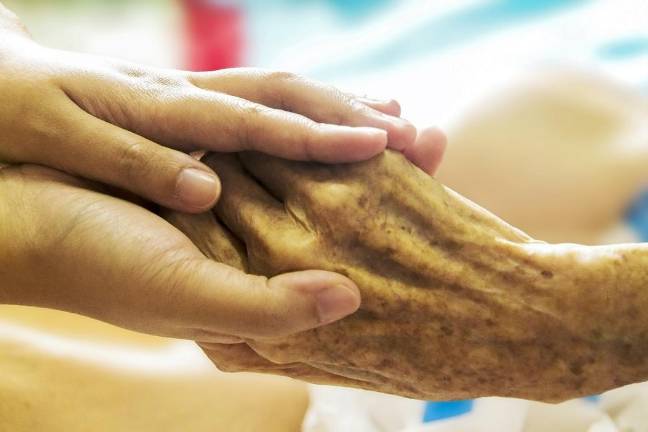What happens volunteering with hospice
Milford. A volunteer with Karen Ann Quinlan Hospice describes her connection with a 90-year-old woman.

For almost a year, Elaine S.* has brought companionship to her client, Ann,* who’s in her 90s and suffers from heart failure. Santiago works as a volunteer for Karen Ann Quinlan Hospice in Milford.
“I was always on the lookout for things she liked. She loved fresh flowers. And I asked a lot of questions: What kind of books do you like? Would you like me to read to you? She’s a very social person and she mostly wanted to talk,” Santiago said.
Elaine has a day job, answering medical information queries for a pharmaceutical company. She sees her client once a week for two hours.
They talk and laugh and have a snack together. Ann likes Dunkin Donuts Coffee and crullers, which Elaine buys and shares with her. Ann always says how good they taste.
Sometimes Ann would say she was tired and Elaine would ask “Do you want me to go?” “Oh, no!” she’d reply. She never remembered Elaine’s name; she had to look at her name tag. When Elaine took her in a wheelchair to the dining hall, the woman’s tablemates asked, “Who is this?” “Ann looked at me and turned to them and said, ‘She’s an aide who took a shine to me,’” Elaine recalled with a laugh.
Elaine would do little things too; water her plant and take care of flowers and charge her phone.
“Ann would say something and I would find something to tag onto about it and tease her a little bit and she loved it,” Elaine said. Ann had a sense of humor; one of her shirts had “Kissable” printed on it and Ann had told another visitor it was her “date night shirt.”
Elaine went to the University of Pennsylvania and met her husband Leo there. When she lived in Philadelphia, she volunteered at an animal shelter. She early demonstrated the willingness to do whatever it took to make things better. She would ask the staff: “How can I help? And they’d say “Do you mind doing the laundry?’ and she’d say, “No, where is it?”
The couple bought a summer house in Milford in 1998 and moved there full time in 2008. Elaine took care of her husband for 15 months when he was dying of colorectal cancer. She later took a “Sacred Passage Doula”** class with the Conscious Dying Institute. End-of-Life Doulas are frontline caregivers who offer non-medical, emotional and spiritual support to families and patients during critical illness and the dying process. They fill in care gaps before, nearing and during death.
What do volunteers get out of their work? “A sense of helping; selflessness. Doing something for somebody and not being paid,” said Elaine. It’s rewarding; you feel like you’re making a difference.”
Last week was the last time Elaine would see Ann; she was moving out of state to be closer to her family. It was an abrupt and unexpected turn of events. “When I found out she was moving; I got sad and went through a kind of grieving process,” Elaine said. “And I said to myself, ‘Why are you sad?’”
“Things change over time and you have to accept it. I’m losing her, but I’m happy for her,” Elaine said. “Now her family can visit often and that’s what she’s focused on. I think she might want to enjoy one last holiday with her family.”
*Name changed to protect privacy.